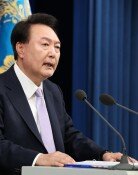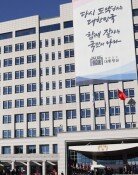Transfer of administrative capital should not be rushed
Transfer of administrative capital should not be rushed
Posted July. 24, 2020 07:50,
Updated July. 24, 2020 07:50
The ruling Democratic Party of Korea is speeding up after its Floor Leader Kim Tae-nyeon suggested moving the administrative capital in his speech at the National Assembly on Monday. “I will make this happen since the transfer is now in public discussion,” said Kim in a policy coordination meeting on Thursday. The ruling party has formed a task force led by Rep. Woo Won-shik and devised action plans that include the enactment of a special act based on the agreement with the opposite parties before the 2022 presidential election.
Although the leadership of the ruling party denies that it is to distract the public’s attention, one cannot help but wonder what is behind this sudden rush to move the administrative capital. The failure of the 22 real estate policy packages and sexual harassment claims against late Seoul Mayor Park Won-soon have driven down the Moon Jae-in administration’s approval rating. In addition, Kim cited the overcrowding in the Seoul metropolitan area and soaring property prices to justify the transfer. This is why relocating all administrative offices is seen as an effort to turn the tide.
Moving the South Korean presidential office Cheong Wa Dae and the National Assembly is practically moving the capital, which is a change that takes such a long time. The transfer would require the reversal of the 2004 constitutional ruling, and it can possibly change the course of the history. The ruling party cannot just plough through its way to get it done. Every policy, no matter how insignificant it is, goes through public discussion. However, the ruling party is forcing its decision made behind the closed doors onto the opposition parties and the public without proper discussions.
There is a long list of issues to be reviewed. The success and failure of Sejong City as an administrative city should be objectively evaluated first before the blueprint is drawn based on the inter-Korean relations and a comprehensive development plan and shared with the public. “North Korea should be considered to move the administrative capital,” said Jung Hae-gu, former policy adviser for President Moon Jae-in, on Tuesday. “The decision should be made after in-depth discussions even if it will take time.”
President Moon said rebuilding the economy after the COVID-19 outbreak is No. 1 priority of the government. The government and the ruling party passed the third supplementary budget, which amounts to over 35 trillion won and plan to invest 76 trillion won over the next five years in the so-called South Korea’s New Deal. How will they fund the transfer of the administrative capital that will cost the nation additional tens of trillions won? If the move, which has been conceived out of political interest, is rushed not least because of the next presidential election, it would not be welcomed by the public.







